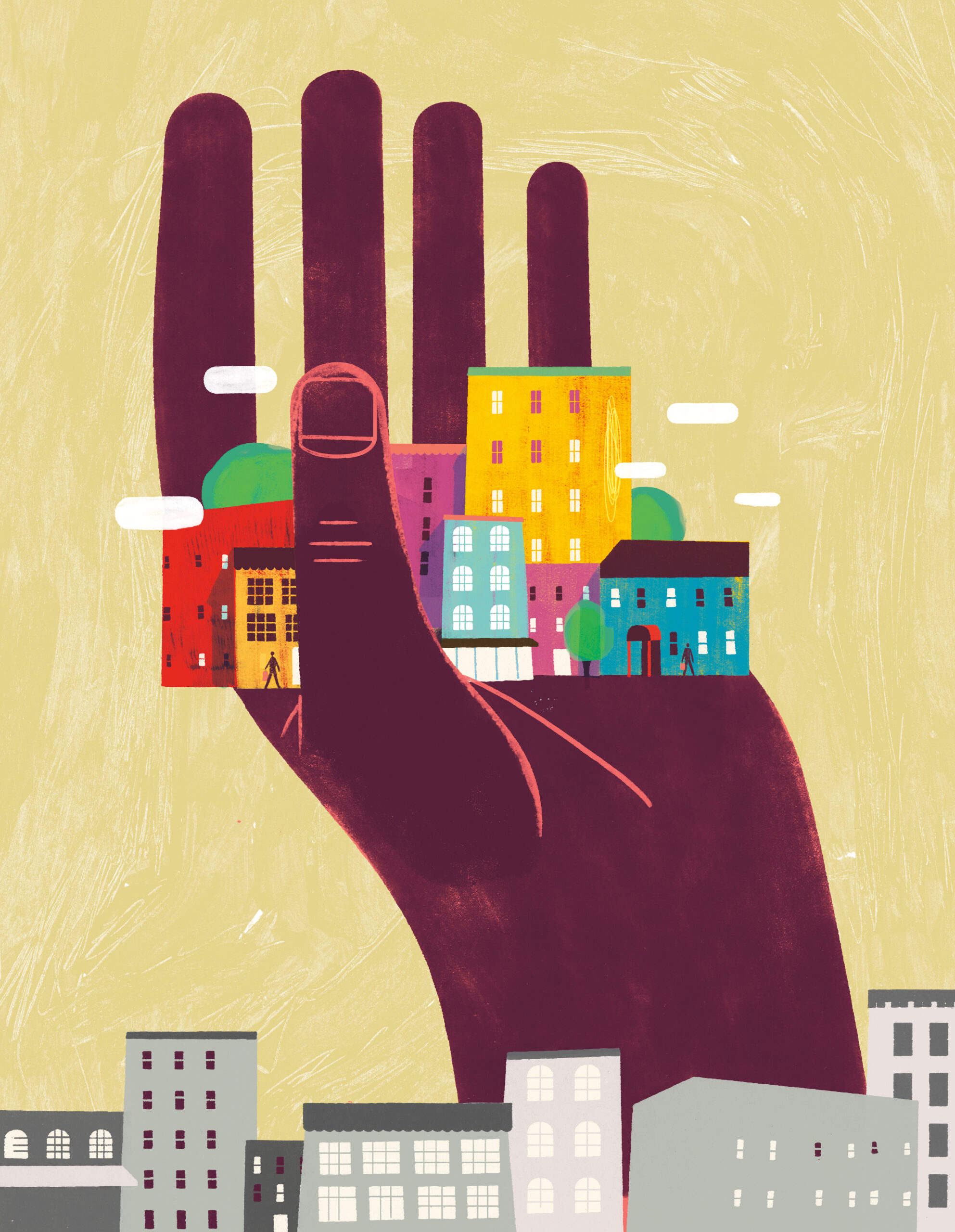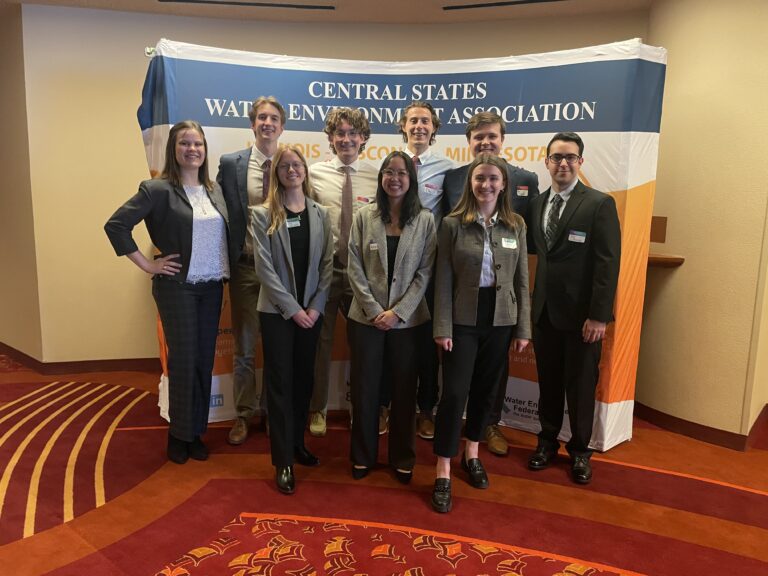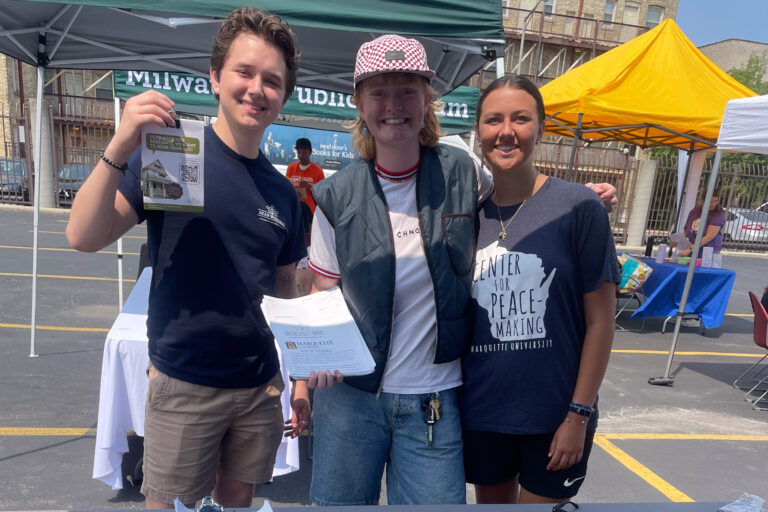Nursing faculty work with Milwaukee community partners to focus their research on real-time health care needs in the neighborhood.
By Lauren Sieben
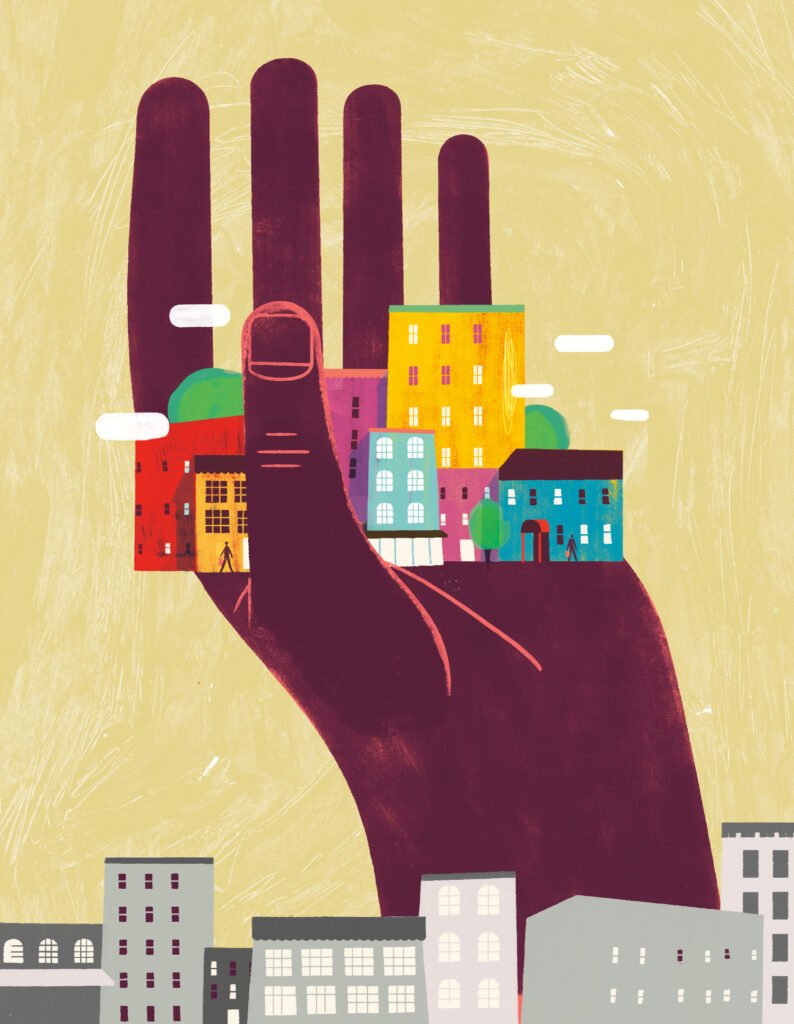
For some people, the idea of “research” might conjure images of professors running experiments in a lab or reviewing academic studies in their office. While these are common components of conventional research, these images don’t paint an accurate portrait of community-engaged scholarship, says Dr. Kristin Haglund, professor of nursing.
Community-engaged research “takes conventional research to a new level that can be more responsive, relevant and meaningful to people in communities and in the world,” says Haglund, Nurs ’92, one of several faculty members in the College of Nursing who conduct research in collaboration with members of the community that helps address community needs. In community-engaged research, Haglund adds, the knowledge, expertise and experience of community members are needed and valued.
“There is a high value on published literature and published randomized control trials,” Haglund says. “Those are very important, no doubt. But when we emphasize the knowledge generated by scholars at the expense of the knowledge generated by the lived experiences of the people we care about, we only get half the picture.”
Early in her career, Haglund’s experience as a nurse in community settings, including the Milwaukee Regional Medical Center and a high school-based health center, led her to start seeking answers to questions affecting the communities she served — her doctoral dissertation looked at how to improve sexual health outcomes for adolescents. In the years since, she has researched violence prevention, promotion of positive development for young people, and other topics with tangible community impact.
“Working with people in the community just solidified my passion around that type of work,” Haglund says. “Doing nursing in partnership with people is the kind of nursing
that I like to do.”
Community-engaged scholarship within the college is making its mark on the broader Milwaukee community, with the combined efforts of faculty such as Haglund, Dr. Dora Clayton-Jones and Dr. Abiola Keller.
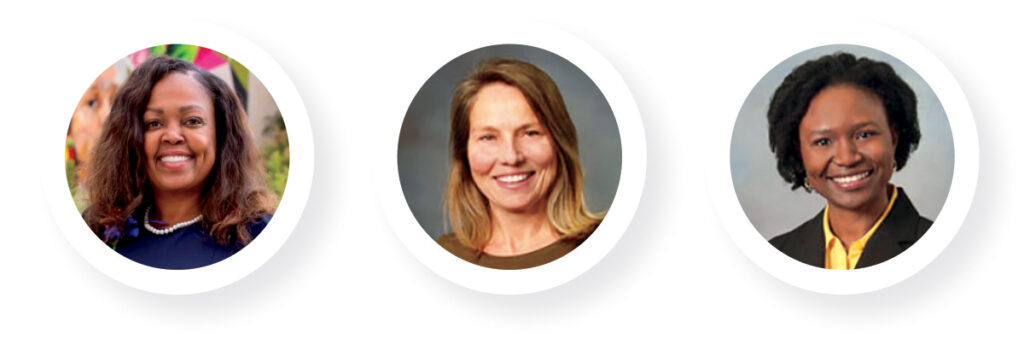
From left to right: Dr. Dora Clayton-Jones; Dr. Kristin Haglund; and Dr. Abiola Keller
Empowering youth living with sickle cell disease
Clayton-Jones, assistant professor, says community engagement has been baked into her values since childhood. Growing up, her grandmother took her to volunteer in a food bank every weekend. “Community service was at the center of my household,” Clayton-Jones says.
After working as a pediatric nurse practitioner in urgent care and school-based health care, Clayton-Jones, Grad ’99, ’14, says her calling to pursue community-engaged research became clear. “Many times, I take a back seat, and I let community members tell me a thing or two,” she says. “I take this seat of humility, which I feel is like a Jesuit principle.”
Clayton-Jones is working on a community-engaged research project titled Eliminating Sickle Cell Disparities Among Youth: The POSSE Project. She is one of 10 recipients of a Betty Irene Moore Fellowship for Nurse Leaders and Innovators from the University of California, Davis nursing school, which provides $450,000 in support of each awardee.
Clayton-Jones first worked with young patients living with sickle cell disease when she was a graduate student. “When I looked at the literature back then, there was no comparison,” she says. “Other populations are more highly funded in comparison to the sickle cell population.”
The condition disproportionately affects Black Americans: About 1 in 13 Black babies is born with sickle cell trait, according to the Centers for Disease Control and Prevention.
Now, Clayton-Jones is using community-engaged scholarship to decrease health disparities among youth living with sickle cell disease by equipping them with the skills to manage their condition. Her project will include a pilot of an intensive two-week summer program on Marquette’s campus in 2022 for 18- to 19-year-olds with sickle cell disease in the Milwaukee area.
That age group often falls through the cracks as they transition from pediatric to adult care, Clayton-Jones says. The challenges of living with sickle cell disease can be pronounced for young people. Due to pain and fatigue, they may not be able to make it to school every day, and their employers may not understand their condition.
During the two-week summer program, “We’ll spend time going over important concepts to support adolescents in their self-management,” she says. Participants will learn how to advocate for themselves in the health care system and how to find vocational opportunities. They will also learn about sickle cell disease in a Marquette lab, where they’ll be able to see firsthand what the genetic condition looks like.
Resident voices speak to community health
Keller, H Sci ’01, assistant professor, says she’s been drawn to community engagement since her Marquette undergraduate years as a Burke Scholar, when she volunteered at service sites in Milwaukee making sandwiches and handing out free meals.
After graduating from the University of Iowa’s physician assistant program, Keller practiced at two immediate care clinics in Madison, Wisconsin. In one clinic, “We saw people that were really sick,” Keller says. “I was taking care of patients, essentially managing their chronic diseases in an immediate care setting or talking with African American women coming in for things like a stomachache or backache. The more I talked to them, I realized they had unmet mental health needs.”
At the clinic on the other side of town, patients mostly came in with orthopedic injuries — “They weren’t as sick,” Keller recalls. “As I started noticing these differences and asking questions, that’s when I became more aware of how our health care system was failing some people more than others.” These experiences influenced her pursuit of a career in health-equity and community-engaged scholarship.
Today, Keller is partnering with Haglund on a research project within the Near West Side neighborhoods to identify community-driven health priorities and map the relevant health assets needed to address those priorities. Their team, which includes faculty, staff and students, surveyed more than 150 residents, asking them what needs to be addressed or improved to foster a healthier community.
They collected more than 300 ideas and combined them into 74 unique clusters, which were then organized, rated and prioritized after the team hosted listening sessions with residents. They will use this information to promote health assets and transform health in the Near West Side.
“This project is an opportunity to demonstrate what can happen when academic institutions work in partnership with communities,” Keller says. “Too often researchers come to communities with preconceived notions of what the problems are and how they should be solved.”
This spring semester, the project is advancing with the formation of health action teams composed of nursing faculty, staff and students, residents and other NWS community partner organizations. The action teams will be assigned a health priority and define and implement interventions, strategies and policies for promoting neighborhood health assets specific to the prioritized health need. Some of the identified priorities, for example, focused on health care for elderly residents. Keller forecasts that they will investigate opportunities for innovation in Marquette’s clinical training programs to prepare students to provide home health care — a win-win for elderly residents and students who gain experience while meeting community needs.
To Keller, the community-engaged scholarship represented by this new project is a way of living the Marquette mission. “It’s not us going into the community and doing research. It’s working with our communities to identify opportunities where we can do things that will promote health,” she says.
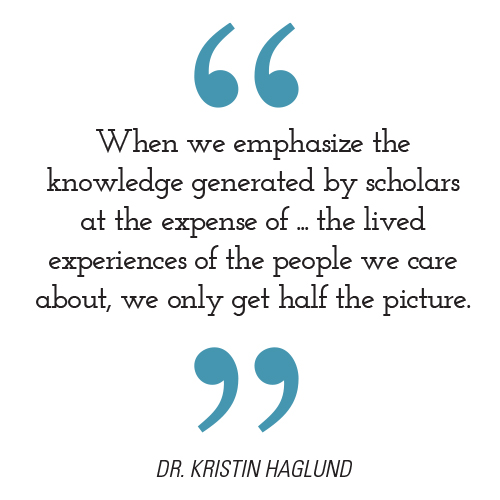
The intersection of nursing, scholarship and social justice
For nursing faculty at Marquette, the connection between cura personalis, or care for the whole person, and community-engaged scholarship is clear, Haglund says. “Our College of Nursing at Marquette has a rich strength in community-engaged research that sets us apart perhaps from other universities,” she says.
Dr. Jill Guttormson, acting dean and associate professor, agrees this research is especially important in aligning with the college’s mission of “advocating for social justice to eliminate health inequities, and engaging with community partners to promote health and improve health outcomes,” she says.
But community-engaged scholarship at Marquette extends beyond the College of Nursing. Haglund recently stepped into a role as advocate for community-engaged research across the university as the Rev. John P. Raynor, S.J., Endowed Chair. As part of her appointment, she will work to raise awareness of community-engaged scholarship across campus and roll out a community-engaged scholarship training program for all faculty.
Ultimately, Haglund hopes this work will help expand the traditional picture of academic research to include not just papers and datasets but also qualitative research in partnership with the community.
“As long as we continue to believe that the scholar’s knowledge is the only knowledge that really matters, we put a blinder on half the world,” Haglund says. “When you begin by asking people who are the cohort of interest: What do you already know about this phenomenon? What is already working for you? What are areas that we need to investigate further? That helps to really put a laser focus on what a problem might be.”
